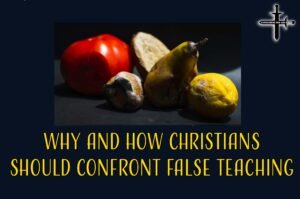Recently on facebook and twitter, I asked people if they had any questions they would like to see answered on the blog. The response was awesome, as people not only asked questions publically but they also sent in emails asking questions. Needless to say, all of you have given me a lot to think about, pray about and write about!
The first question comes from Joe in Illinois who wanted to know, “How do I deal with unforgiveness in my heart? Unforgiveness and bitterness is an issue that I have personally dealt with in my walk with God. Growing up my father did not treat my mom, my brothers or me very well. Growing up, I was mentally and emotionally abused. There was a time in my life for many years where I held onto anger, bitterness, and resentment against my entire family.
One day as a junior in high school, I was sitting on my bed praying with my Bible open reading Colossians 3:12-13 which says, “Put on then, as God’s chosen ones, holy and beloved, compassionate hearts, kindness, humility, meekness, and patience, bearing with one another and, if one has a complaint against another, forgiving each other; as the Lord has forgiven you, so you also must forgive.”
When I read the part in Colossians 3:13 that says, “Forgiving each other; as the Lord has forgiven you, so you also must forgive”, I was convicted deeply, and began to cry. Rather than just turning away from God, I genuinely repented of my own feelings of anger, and bitterness towards my father and family. The next day my father and I took a walk and I asked him if he would forgive me for my anger and bitterness towards him. His answer was, “Yes!”
I’ve often thought back to that day when my dad and I walked down that road. Often times through the years I’ve thought back to that road where my dad and I walked many years ago. That road for me was a crossroads. The day the Lord revealed and convicted me in my room of my sin of anger, bitterness and resentment was a day I’ll never forget.
As I’ve reflect back on that day, I can truly say that day was a turning point in my life. It was a turning point because as I prayed the Lord spoke clearly through His Word in Matthew 6:14-15 and Colossians 3:13 that I had not forgiven my father or my family, and if I continued to hold onto my sin instead of trusting in Him, I would not be forgiven.
Colossians 3:13, “As the Lord has forgiven.” Christ is the model of forgiveness because He has forgiven all of our sins totally; believers now must be willing to forgive others (Colossians 1:14; 2:13-14). When wronged and betrayed Christians are called to forgive others, even as they have been forgiven for their betrayal of Christ (Matthew 6:12; 14-15; 18:21-22).
In the Lord’s Prayer Jesus taught His Disciples in Matthew 6:12 to pray, “and forgive us our debts, as we have forgiven our debtors.” Matthew 6:14-15 says, “For if you forgive others their trespasses, your heavenly Father will also forgive you, but if you do not forgive others their /trespasses, neither will your Father forgive your trespasses.”
Forgive us our debts is the fifth petition in the Lord’s Prayer and does not mean that believers need to ask daily for justification since believers are justified forever from the moment of initial saving faith (Rom. 5:1, 9; 8:81; 10:10). Rather this is a prayer of restoration of personal fellowship with God when fellowship has been hindered by sin. Those who have received such forgiveness are so moved with gratitude toward Gog that they also eagerly forgive those who are debtors to them.
When Jesus in Matthew 6:14-15 says “Forgive others” He is reemphasizing the importance of forgiving others, indicating there is a direct relationship between having been forgiven by god and the forgiveness that his disciples of necessity must extend to others. As in vs. 12, forgive your trespasses here refers to restoration of personal relationship with god, not to initial justification.
Man’s greatest problem is sin, and his greatest need is forgiveness, and this is what God provides. Though we have been forgiven the ultimate penalty of sin, as Christians we need God’s constant forgiveness for the sins we continue to commit. Asking for forgiveness implies confession. John in 1 John 1:9 says, “If we confess our sins He is faithful and just to forgive us our sins and to cleanse us from all unrighteousness”. To confess means to agree with and when we confess our sins we agree with God about them that they are wicked, evil and defiling and have no part those who belong to Him.
It is difficult to confess sins and both Satan and our prideful nature fight against it. But it is the only way to the free and joyful life. Proverbs 28:13, “he who conceals his transgressions will not prosper, but he who confesses and forsakes them will find compassion.” John Stott says, “One of the surest antidotes to the process of moral hardening is the disciplined practice of uncovering our sins of though and outlook, as well as of word and of deed, and the repentant forsaking of them” (Confess Your Sins Waco, Texaas: Words ,1974), p.19).
The true Christian does not see God’s promise of forgiveness as a license to sin a way to abuse His love and presume on His grace. Rather he or she sees God’s gracious forgives as the means of spiritual growth and sanctification and continually gives thanks to God for His great love and willingness to forgive and forgive and forgive. It is also important to realize that confessing sin gives God the glory when He chastens the disobedient Christian because it removes any complaint that God is unfair when He disciplines.
A Puritan saint of many generations ago prayed, “Grant me never to lose sight of the exceeding sinfulness of sin, the exceeding righteousness of salvation, the exceeding glory of Christ, the exceeding beauty of holiness, and the exceeding wonder of grace.” At another time he prayed, “I am guilty but pardoned. I am lost but saved. I am wandering but found. I am sinning but cleansed. Give me perpetual broken-heartedness. Keep me always clinging to Thy cross” (Arthur Bennett, ed., The Valley of Vision: A collection of Puritan Prayers and Devotions (Edinburg: Banner of Truth, 1975), pp. 76,83).
Jesus gave the prerequisite for receiving forgiveness in the words, as we have forgiven our debtors. The principle is simple but sobering: if we have forgiven, we will be forgiven; if we have not forgiven, we will not be forgiven.
We are to forgive because it is the character of righteousness, and therefore of the faithful Christian life to forgive. Citizens of God’s kingdom are blessed and receive mercy because they themselves are merciful (Matthew 5:7). They love even their enemies because they have the nature of the loving heavenly Father within them (Matthew 5:44-45, 48). Forgiveness is the mark of a truly regenerate heart. Still we fail to be consistent with that mark and need constant exhortation because of the strength of sinful flesh (Rom. 7:14-25).
We are also to be motivated to forgive because of Christ’s example: “Be kind to one another, “Paul says, “tender-hearted, forgiving each other, just as God in Christ also has forgiven you” (Eph 4:32). John tells us, “the one who says he abides in Him ought himself to walk in the same manner as He walked” (1 John 2:6).
Because it reflects God’s own gracious forgiveness, the forgiving of another person’s sin expresses the highest virtue of man. “a man’s discretion makes him slow to anger, and it is his glory to overlook a transgression” (Prov. 19:11).
Forgiving others also frees the conscience of guilt. Unforgiveness not only stands as a barrier to God’s forgiveness but also interferes with peace of mind, happiness, satisfaction, and even the proper functioning of the body.
Forgiving others is of great benefit to the whole congregation of believers. Few things have so short-circuited the power of the church as unresolved conflict among its members. “if I regard wickedness in my heart,” the psalmist warns himself and every believer,” The Lord will not hear” (Ps. 66:18). The Holy Spirit cannot work freely among those who carry grudges and harbor resentment (Matthew 5:23-24; 1 Cor. 1:10-13; 3:1-9).
Forgiving others also delivers us from God’s discipline. Where there is an unforgiving spirit, there is sin; and where there is sin, there will be chastening (Hebrews 12:3-13). Unrepented sins in the church at Corinth caused many believers to be weak, sick, and even to die (1 Cor 11:30).
The most important reason for being forgiving is that it brings God’s forgiveness to the believer. That truth is so important that Jesus reinforces it after the close of the prayer which we will turn to shortly in Matthew 6:14-15. Nothing in the Christian life is more important than forgiveness- our forgiveness of others and God’s forgiveness of us.
In the matter of forgiveness, God deals with us as we deal with others. We are to forgive others as freely and graciously as God forgives us. The Puritan writer Thomas Manton said, “There is none so tender to others as they which have received mercy themselves, for they know how gently God hath dealt with them.”
The prayer lesson of Jesus concludes with a reminder that follows the teaching of forgiveness in Matthew 6:12. This is the Savior’s own commentary on our petition to God for forgiveness, and the only one of the petitions to which he gives added insight. Thus its importance is amplified for us.
“For if you forgive others their trespasses” puts the principle in a positive mode. Believers should forgive as those who have received judicial forgiveness (Eph 1:7; 1 John 2:1-2) from god. When the heart is filled with such a forgiving spirit, “your heavenly father will also forgive you”. Believers cannot know the parental forgiveness, which keeps fellowship with the Lord rich and blessings from the Lord profuse, apart from forgiving others in heart and word. Forgive (aphimei) means literally “to hurl away.”
Paul had this in mind when he wrote, “I found mercy, in order that in me as the foremost of sins, Jesus Christ might demonstrate His perfect patience (1 Tim. 1:16; Matthew 7:11). Un unforgiving spirit not only is inconsistent for one who has been totally forgiven by God, but also brings the chastening of God rather than His mercy. Our Lord Jesus illustrates the unmerciful response in the parable of Matthew 18:21-35. There a man is forgiven the unpayable debt representing sin and is given the mercy of salvation. He then refuses to forgive another and is immediately and severely chastened by God.
“But if you do not forgive others their trespasses, neither will your Father forgive your trespasses” That states the truth of verse 14 in a negative way for emphasis. The sin of an unforgiving heart and a bitter spirit (Heb. 12:15) forfeits blessing and invites judgment.
Every believer must seek to manifest the forgiving spirit of Joseph (Gen. 50:19-21) and of Stephen (Acts 7:60) as often as needed (Luke 17:3-4). To receive pardon from the perfectly holy God and then to refuse to pardon others when we are sinful men is the epitome of abuse and of mercy. And “judgment will be merciless to one who has shown no mercy; mercy triumphs over judgment” (James 2:13).
Jesus has given petitions for the believer to ask from God in the Lord’s Prayer, but there are also conditions for the answers to be received. Even more, our prayers are to be primarily concerned with the exaltation of the name, kingdom, and will of the Lord Jesus Christ. Prayer is primarily worship which inspires thanks and personal purity.
That day sitting in my bedroom with the Bible open and praying I forgive my father and my family. I realized as I read the Scriptures and as I prayed that if I did not forgive, I would not be forgiven by the Lord Jesus.
Today, we have looked at how one can be forgiven- through the blood of the crucified and risen Christ. I was only able to forgive. because I acknowledged that I was a sinner in need of His mercy. You will only be able to forgive those who have wronged you, abused you, spoken ill of you or any other sin because of the finished work of Christ. You will only be able to forgive as you- yourself know, acknowledge and confess your allegiance to the glorious work of Christ in His death, burial and resurrection. It is only through Christ- that one can be forgiven, because it is only Christ who suffered, shed His own bled and died in our place for our sin so that we could come boldly before His throne of grace and mercy and cry out “Abba Father.”
Dave Jenkins is happily married to his wife, Sarah. He is a writer, editor, and speaker living in beautiful Southern Oregon. Dave is a lover of Christ, His people, the Church, and sound theology. He serves as the Executive Director of Servants of Grace Ministries, the Executive Editor of Theology for Life Magazine, the Host and Producer of Equipping You in Grace Podcast, and is a contributor to and producer of Contending for the Word. He is the author of The Word Explored: The Problem of Biblical Illiteracy and What To Do About It (House to House, 2021), The Word Matters: Defending Biblical Authority Against the Spirit of the Age (G3 Press, 2022), and Contentment: The Journey of a Lifetime (Theology for Life, 2024). You can find him on Facebook, Twitter, Instagram, Youtube, or read his newsletter. Dave loves to spend time with his wife, going to movies, eating at a nice restaurant, or going out for a round of golf with a good friend. He is also a voracious reader, in particular of Reformed theology, and the Puritans. You will often find him when he’s not busy with ministry reading a pile of the latest books from a wide variety of Christian publishers. Dave received his M.A.R. and M.Div through Liberty Baptist Theological Seminary.






